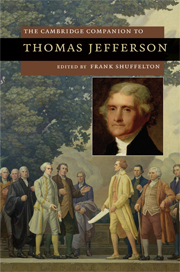Book contents
- Frontmatter
- Introduction
- 1 The Declaration of Independence and the new nation
- 2 Jefferson’s conception of republican government
- 3 Notes on the State of Virginia and the Jeffersonian West
- 4 Jefferson and Native Americans: policy and archive
- 5 Race and slavery in the era of Jefferson
- 6 Jefferson’s people: slavery at Monticello
- 7 Jefferson, science, and the Enlightenment
- 8 Thomas Jefferson and the creation of the American architectural image
- 9 The politics of pedagogy: Thomas Jefferson and the education of a democratic citizenry
- 10 Jefferson and religion: private belief, public policy
- 11 Jefferson and the language of friendship
- 12 Jefferson and Adams: friendship and the power of the letter
- 13 The resonance of minds: Thomas Jefferson and James Madison in the republic of letters
- 14 Jefferson and the democratic future
- Further reading
- Index
6 - Jefferson’s people: slavery at Monticello
Published online by Cambridge University Press: 28 May 2009
- Frontmatter
- Introduction
- 1 The Declaration of Independence and the new nation
- 2 Jefferson’s conception of republican government
- 3 Notes on the State of Virginia and the Jeffersonian West
- 4 Jefferson and Native Americans: policy and archive
- 5 Race and slavery in the era of Jefferson
- 6 Jefferson’s people: slavery at Monticello
- 7 Jefferson, science, and the Enlightenment
- 8 Thomas Jefferson and the creation of the American architectural image
- 9 The politics of pedagogy: Thomas Jefferson and the education of a democratic citizenry
- 10 Jefferson and religion: private belief, public policy
- 11 Jefferson and the language of friendship
- 12 Jefferson and Adams: friendship and the power of the letter
- 13 The resonance of minds: Thomas Jefferson and James Madison in the republic of letters
- 14 Jefferson and the democratic future
- Further reading
- Index
Summary
Thomas Jefferson became a slaveholder by inheritance. From the summer of 1757, when his father wrote “I Give & Bequeath to my son Thomas my mulattoe Fellow Sawney,” he was entangled in an unjust legal and economic system that he was unable to escape or abolish. When he turned 21, in 1764, he gained legal title to about 30 human beings from his father's estate. Ten years later he received 135 more after the death of his father-in-law, John Wayles. From 1770 Jefferson lived on the top of an 867-foot mountain in Albemarle County, directing the operations of a tract that grew from almost 3,000 to over 5,000 acres. John Wayles's death transformed Monticello from an ordinary tobacco plantation to the central nerve center of a far-flung economic enterprise. After the division of Wayles's estate in January 1774, Jefferson had tripled his real property, to 14,000 acres of land and 187 human beings. He now owned four major plantations in Virginia's Piedmont: Monticello, Elk Hill and Willis Creek 40 miles to the east, and Poplar Forest 90 miles to the southwest. A rather well-to-do planter had instantly become one of the wealthiest men in the colony. Over his long life, during which he purchased fewer than 20 slaves, Jefferson considered himself the owner of more than 600 people - “those whom fortune has thrown on our hands.”
- Type
- Chapter
- Information
- The Cambridge Companion to Thomas Jefferson , pp. 83 - 100Publisher: Cambridge University PressPrint publication year: 2009
- 3
- Cited by

